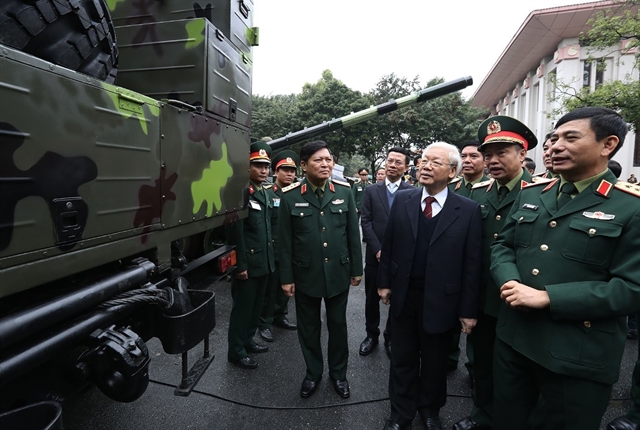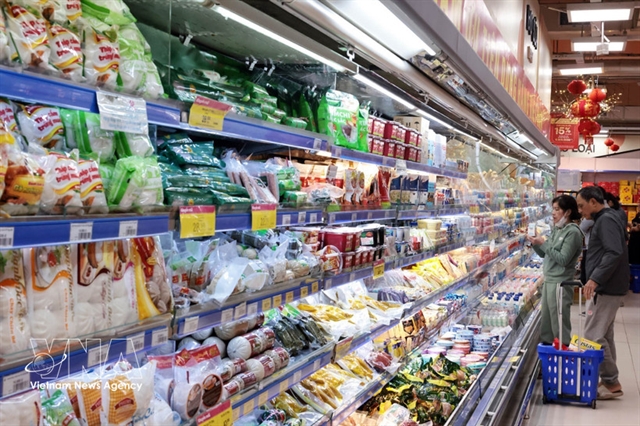 Politics & Law
Politics & Law

The Việt Nam People’s Army (VPA) has always served as the core force to, together with the Party and the people, achieve accomplishments in national liberation and construction and defence throughout its 75-year history, Party General Secretary and President Nguyễn Phú Trọng has said.

|
| General Secretary and President Nguyễn Phú Trọng inspects military equipment on exhibition at the political-military conference in 2018. — VNA/VNS Photo Trí Dũng |
HÀ NỘI The Việt Nam People’s Army (VPA) has always served as the core force to, together with the Party and the people, achieve accomplishments in national liberation and construction and defence throughout its 75-year history, Party General Secretary and President Nguyễn Phú Trọng has said.
In an article published for the 75th founding anniversary of the VPA (December 22, 1944), the Party and State leader stressed those accomplishments were the results of multiple factors, of which the Communist Party of Việt Nam’s (CPV)’s comprehensive, absolute and sound leadership is a decisive one.
Trọng, who is also Secretary of the Central Military Commission, says in the article the Party has flexibly applied Marxism-Leninism and President Hồ Chí Minh’s thought to build a new-style army that suits the specific situation in Việt Nam. The Party also affirmed the inevitable need to turn the army into the key force in the cause of national liberation and defence.
During the resistance war against the invading French colonialists, the VPA won glorious achievements, including the 1953-1954 Winter-Spring Campaign with the peak of the Điện Biên Phủ victory that forced the French government to sign the Geneva Accords in 1954, ending the war and restoring peace in Indochina.
This was the first time in contemporary history that an army equipped with rudimentary weapons defeated a professional counterpart, which marked the beginning of the collapse of colonialism and provided a strong boost to the national liberation movement around the world, he stressed.
In the anti-US war, the VPA, along with the entire Party and people, consecutively foiled war strategies. Such great victories won by the Vietnamese army and people drove the US to sign the Paris Peace Accords that committed to put an end to the war, and created a premise for the Spring General Offensive and Uprising in 1975, culminating with the historic Hồ Chí Minh Campaign, leading to the full liberation of South Việt Nam, national reunification and the end of the 30-year resistance war, the leader said.
Not only fighting to liberate their own country, with a pure proletarian international spirit, the VPA has also stood side by side with armed forces of Laos and Cambodia in the fight against common enemies.
Right after the anti-US war ended, the VPA immediately embarked on another fierce battle to protect the national border and performed its international mission of helping Cambodian people escape genocide.
During the cause of national construction and defence in the renewal period, the army has carried forward its role in combat and production, while serving as an advisor of the Party and the State in military, national defence and drafting strategic guidelines for national protection.
At the same time, it has made outstanding performance in defence diplomacy, contributing to building a peaceful and stable environment for national building and development, Trọng says.
Over the past 75 years, in any revolutionary period, even the toughest time, the CPV has maintained its comprehensive, absolute and direct leadership over the VPA.
This is an important factor for the success of national building and safeguarding, and also the decisive factor for the growth, combat capacity and triumph of the army, he says.
The Party General Secretary points out that unforeseeable and complex developments are lying ahead in the regional and global situation, along with increasing traditional and non-traditional security challenges and fierce strategic competition between world powers.
The East Sea (known as the South China Sea) issue also contains many unexpected risks, he says, adding that the trend of connectivity, globalisation and the Fourth Industrial Revolution have been exerting profound impacts on all countries in various spheres.
Inside the country, the macro economy has been stabilised but not quite sustainably. Although Việt Nam’s internal strength has been consolidated and its prestige and position in the international arena have been rising, the country still faces a range of difficulties and challenges.
The Party leader also called attention to the fact that hostile forces have stepped up the so-called “peace process,” “self-evolution,” “self-transformation,” “non-politicisation,” and “civilisation” of the army, especially before, during and after all-level Party congresses and the 13th National Party Congress.
The cause of national construction and defence goes with heavy requirements, with the struggle to safeguard the country’s sovereignty over its sea, islands and territorial integrity forecast to be a tough, long-term and complex one.
In 2020 and the years to come, the VPA will have to take on tougher tasks, he said, requiring the Party to maintain and enhance its absolute, direct and comprehensive leadership over the VPA in order to help the army complete its missions.
“We believe that with its 75-year history of building and fighting under the Party leadership, the VPA will continue to write more glorious historical pages for the nation,” he concludes. VNS




